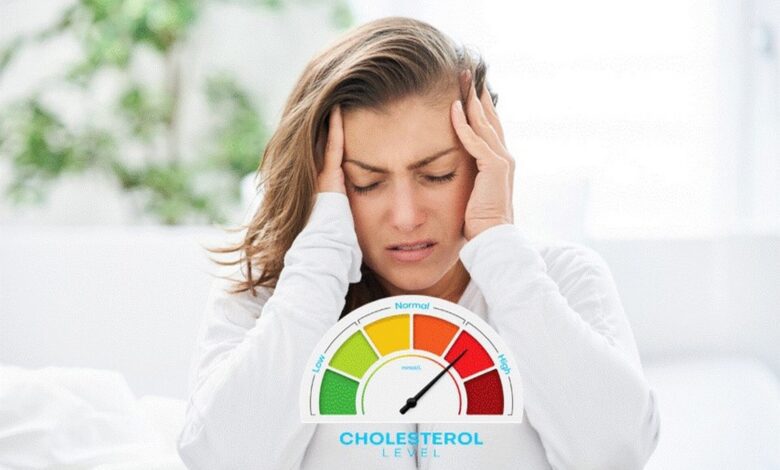Does High Cholesterol Cause Headaches? An In-depth Analysis

Modern society witnesses a surge in concerns related to High Cholesterol and its myriad effects. One pertinent question often asked is, “Does high cholesterol lead to frequent headaches?” We’ll unravel this conundrum and dive deep into the intricacies of cholesterol’s impact on our well-being.
Headaches, as most of us know, can have a myriad of causes, from stress to more complex medical conditions. Is high cholesterol one of them? This comprehensive analysis will explore the subtle connections, backed by science, between cholesterol and headaches.
1. Introduction
Cholesterol, an essential lipid, plays a pivotal role in our health. However, when its levels rise excessively, it brings along a slew of complications, with Headaches being a potential concern. This article aims to provide clarity on the link, if any, between high cholesterol and the onset of headaches.
- High Cholesterol: More than just a number
- Headaches: Pervasive yet often misunderstood
- Cholesterol Symptoms: Beyond the obvious
1.1. The Link Between Health and Cholesterol
The human body requires cholesterol to build cell membranes, produce hormones, and execute several other crucial functions. However, elevated Cholesterol Levels could result in severe repercussions, affecting our overall health.
- LDL Cholesterol (Bad Cholesterol): Excess of it clogs arteries.
- HDL Cholesterol Levels (Good Cholesterol): Protects against heart diseases.
- Total Cholesterol: A holistic measure that should be in a healthy range.
But does this lipid, vital yet dangerous in excess, have any bearing on the pounding in our heads? Let’s explore.
1.2. Headaches: A Common Ailment with Diverse Causes
From tension headaches to migraines, headaches are more than just a pain; they are indicative of our body’s underlying conditions. The Causes of Headaches are diverse, with factors ranging from environmental to biological playing a part.
- Cholesterol and Migraines: A speculated link worth exploring.
- Headache Causes: Stress, dehydration, and could it be cholesterol?
- High Cholesterol Effects: Understanding the broader repercussions on health.
As we delve deeper into headaches’ causative factors, it’s worth pondering: Can elevations in cholesterol levels truly cause that throbbing pain?
1.3. Purpose of This Analysis
In this comprehensive analysis, our intent is straightforward. We strive to dissect the relationship between High Cholesterol and headaches, offering readers a clear perspective rooted in science and research.
- Deciphering Myths: Does having high cholesterol always equate to headaches?
- Addressing Queries: Can high LDL cholesterol cause severe headaches or even migraines?
- Offering Insights: Are headaches truly associated with high cholesterol?
By the end of this exposition, we aim to equip readers with knowledge, empowering them to make informed decisions about their health.
2. Understanding Cholesterol
Cholesterol, a term often tossed around in health circles, is more than just a number. It’s a crucial component of cell membranes and is essential for producing various hormones. However, high levels of cholesterol can be a concern, often linked with various ailments.
Yet, with the myriad of health conditions related to high cholesterol, many wonder about its direct and indirect effects. One recurring query is its link to headaches. Here, we’ll delve into what cholesterol really is and how it might affect our health beyond the standard warnings.
2.1. High Cholesterol: What Does It Mean?
When we hear “high cholesterol,” it’s not always the full picture. Cholesterol, by nature, isn’t bad. In fact, our bodies need it for various functions. However, imbalance is where issues arise.
- Definition and Importance of Cholesterol Cholesterol is a waxy substance that travels through the blood. Vital for building healthy cells, too much can lead to health issues.
- Good Cholesterol vs. Bad Cholesterol: HDL and LDL Not all cholesterol is made the same. HDL, known as good cholesterol, helps remove cholesterol from the bloodstream. Conversely, LDL, or bad cholesterol, can lead to artery blockage if levels rise too high.
2.2. Cholesterol Symptoms & Warning Signs
Identifying cholesterol symptoms early can be a lifesaver, literally. Yet, high cholesterol often sneaks in without loud announcements, making it a silent risk.
- Recognizing the Symptoms of High Cholesterol in Adults Symptoms might be elusive, but some individuals report fatigue, headaches, or blurred vision.
- Total Cholesterol: What’s the Safe Limit? While numbers may vary slightly by health organizations, most agree that total cholesterol levels should remain below 200 mg/dL to be considered ‘desirable.
2.3. High Cholesterol Effects on the Body
Beyond numbers and limits, high cholesterol’s tangible effects on the body can be detrimental, leading to severe complications if left unchecked.
- Impact on Blood Vessels and Circulation Excessive LDL cholesterol can lead to deposits in blood vessels, making it hard for blood to circulate efficiently. This can cause issues like varicose veins or even deep vein thrombosis.
- Relation to High Blood Pressure and Cardiovascular Diseases It’s well-documented that high cholesterol can lead to high blood pressure. Over time, this can stress the heart and blood vessels, potentially leading to strokes or heart attacks.
In conclusion, while cholesterol is essential for our body’s functions, imbalances can wreak havoc. As the silent nature of high cholesterol can make it challenging to detect, it’s vital to understand its nuances, from HDL to LDL, and from cholesterol symptoms to its potential effects. By keeping a vigilant eye on our health and understanding the signals our body sends, we can navigate the maze of information and make informed decisions for our well-being.
3. Diving into Headaches
Headaches are a familiar ailment for many. Whether it’s the pressing tension of a tight band around your head or the sharp throbs accompanying a migraine, we’ve all felt the discomfort. How much of this can be tied back to our body’s cholesterol levels?
It’s quite perplexing to think that something as common as a headache might be related to high cholesterol. Especially when considering the myriad causes that can trigger it. Is there a link? Let’s dive in and figure this out.
3.1. Types and Causes of Headaches
- Tension Headaches: Often described as a dull, aching sensation all over the head. It’s frequently accompanied by tenderness in the neck, forehead, and on the scalp.
- Migraines: More intense and can last longer than tension headaches. They’re characterized by throbbing pain and can cause sensitivity to light or sound.
- Cluster Headaches: These are severely painful headaches that occur in a series, or “clusters”, and can last weeks or months.
Headaches aren’t just about physical pain. They often have underlying headache causes. It can range from the everyday stressors of life to more concerning medical conditions. Some common triggers include:
- Emotional stress
- Skipping meals
- Alcohol
- Eye strain
- Sinus infection or allergies
- High blood pressure
3.2. Cholesterol and Migraines: Is There a Link?
Recent studies hint at a fascinating connection. Some research suggests that individuals with high LDL cholesterol levels might be more prone to migraines. But how can cholesterol affect our head’s well-being?
- Inflammation and Blood Vessels: High levels of bad cholesterol can cause inflammation in the blood vessels, potentially leading to migraines.
- Blood Flow to the Brain: Elevated cholesterol levels might impact the blood flow to the brain, contributing to headache triggers.
Though the evidence is still in its nascent stages, it’s intriguing to think that managing our cholesterol levels might also help in managing those pesky migraines. The link between migraines and cholesterol levels is a topic under ongoing exploration.
3.3. Headaches as a Symptom of Other Health Issues
If someone told you your headache might be an indicator of something more pressing, would you be concerned? It’s essential to be aware and not just brush off recurring headaches.
- High Blood Pressure: Often called the “silent killer,” this can be a cause for those unexplained headaches. Elevated pressure in blood vessels causes strain, leading to headaches.
- Diabetes and High Cholesterol: It’s not just about sugar levels. Diabetes can sometimes lead to headaches. Coupled with high cholesterol, this can be a double whammy for your head.
- Vertigo: Dizziness and spinning sensations can be tied back to high cholesterol blocking inner ear arteries.
In essence, if you’re experiencing frequent headaches, it’s not just about managing pain; it’s about understanding and treating the root causes. Could it be high cholesterol? Or perhaps another underlying health condition? Being aware and proactive is the first step to wellness.
4. Analyzing the Direct Connection
It’s no secret that High Cholesterol is a common health concern. But how does it relate to those persistent headaches you might be experiencing? Let’s dive deep into the intricate ties between the two.
High Cholesterol is not just about numbers on a report. It’s about how those numbers impact our body. And while it’s widely known that cholesterol affects our heart, it’s lesser-known how it affects our brain. Especially when it comes to headache causes.
4.1. Does High Cholesterol Lead to Frequent Headaches?
- Research Findings and Data Analysis:
Recent studies have shed light on a surprising discovery. Elevated cholesterol levels seem to be linked to a higher incidence of headaches. Here’s what the data suggests:
- Individuals with High Cholesterol tend to report more frequent migraines.
- The type of cholesterol, be it LDL Cholesterol (often termed “Bad Cholesterol”) or HDL Cholesterol Levels (“Good Cholesterol”), also plays a significant role in headache frequency.
- Side Effects of High Cholesterol on the Brain:
A lesser-known fact about cholesterol is its potential side effects on the brain. Cholesterol symptoms are not just limited to physical indicators. Some neurological effects include:
- Restricted blood flow due to plaque buildup in blood vessels.
- Potential changes in brain chemistry leading to headaches.
4.2. Physical Symptoms and Their Indicators
- How Does High Cholesterol Cause Headaches?:
You might wonder how a factor like cholesterol, typically linked to heart health, could cause headaches. Here’s the deal:
- Cholesterol can cause plaque buildup, narrowing blood vessels.
- This can restrict oxygen flow to the brain, resulting in tension or migraines.
- Does Having High Cholesterol Necessarily Mean More Headaches?:
Not necessarily. While there’s a link between high cholesterol effects and headaches:
- Not everyone with elevated cholesterol will experience headaches.
- Other factors, such as high blood pressure and genetics, can also play a role in headache frequency.
4.3. Related Symptoms and Complications
- Can High Cholesterol Cause Fatigue and Blurred Vision?:
Yes, and it’s alarming. High Cholesterol doesn’t just stop at headaches. Some related symptoms include:
- Fatigue, due to reduced oxygen supply.
- Blurred vision, potentially from narrowed vessels affecting the eyes.
- The Risk of More Severe Complications: Stroke and Heart Attack:
Now, this is where it gets serious. Elevated cholesterol isn’t just about headaches or fatigue. Consider this:
- High cholesterol significantly raises the risk of severe complications, like strokes.
- The plaque buildup can lead to blockages, resulting in heart attacks or cerebrovascular incidents.
In conclusion, while high cholesterol and headaches might seem worlds apart, they are more connected than we previously thought. If you’re battling unexplained headaches, it might be time to check those cholesterol levels. And as always, prioritize your health and stay informed.
5. Managing Cholesterol and Preventing Headaches
High cholesterol has puzzled many, often linking it with various health anomalies. Headaches, as prevalent as they are, become subjects of intrigue when considered alongside high cholesterol effects.
Cholesterol’s role in our well-being is undeniable. While it’s crucial for bodily functions, the thin line between optimum and harmful cholesterol levels can redefine our health trajectory.
5.1. Effective Methods to Control Cholesterol Levels
Adapting your diet plays a pivotal role in cholesterol management. Incorporating changes isn’t just about reductions; it’s a broader approach to healthy living.
- Dietary Changes: There’s more to consider than just avoiding greasy fast food. It’s about comprehensively understanding the foods we consume. Reducing saturated fats and LDL cholesterol paves the way for improved heart health and a reduced headache frequency. Foods rich in omega-3 fatty acids, like fish and walnuts, can combat the detrimental effects of bad cholesterol.
- Importance of Monitoring HDL Cholesterol Levels: While the spotlight often shines on reducing LDL, the significance of HDL cholesterol levels shouldn’t be sidelined. Known as the good cholesterol, HDL plays a protective role. Regular check-ups and being proactive about one’s health can mitigate unforeseen medical challenges. But what about the headaches? Let’s dive deeper.
5.2. Headache Management and Prevention
Cholesterol and migraines might sound unrelated, but intertwined factors often bridge the gap between the two. Grasping headache causes can lead to better preventive strategies.
- Treating Tension and Severe Headaches: With the influx of daily stressors, tension headaches have become commonplace. While it’s essential to tackle the immediate pain, digging deeper to address the root cause is paramount. Could high cholesterol be a culprit? Possibly. With cholesterol symptoms often being silent, headaches might be an indicator, especially if they’re frequent.
- Addressing the Root Causes: Rather than merely masking the pain with over-the-counter medication, it’s imperative to understand the triggers. For some, it’s stress or dehydration, while for others, it might be an underlying health condition like high blood pressure. Is high cholesterol linked to headaches? Research suggests potential correlations, especially considering the side effects of high cholesterol on the brain.
5.3. Lifestyle Changes for Overall Well-being
A holistic approach to wellness isn’t limited to diet and exercise. It encompasses a range of habits that collectively contribute to health optimization.
- Exercise, Diet, and Stress Management: Regular physical activity not only strengthens the heart but also aids in maintaining optimal cholesterol levels. Coupling this with a balanced diet and effective stress management techniques can be a formidable trio against both high cholesterol and debilitating headaches.
- Periodic Health Check-ups and Screenings: While we can be proactive, regular medical consultations add an extra layer of safety. These check-ups can highlight potential red flags, like fluctuating cholesterol levels or the onset of conditions like diabetes, which might indirectly contribute to headaches.
In the quest for a headache-free life, the cholesterol factor is worth considering. Understanding its nuances, making necessary lifestyle changes, and staying informed can pave the way for a healthier tomorrow. Because isn’t that what we all strive for?
6. Conclusion
Understanding the complexities surrounding high cholesterol and its potential effects on the body, such as causing headaches, has been an ongoing journey. As we dissect the multifaceted world of cholesterol, its implications, and the questions it raises, it’s evident that a comprehensive grasp is essential for holistic health.
High cholesterol isn’t just a singular health concern. It’s an intricate web, interlacing with various facets of our health and wellbeing. The realm of cholesterol symptoms, especially its possible linkage to headaches, is both fascinating and crucial to decode.
6.1. Deciphering the Complexity of Cholesterol and Headaches
High cholesterol is often viewed as a silent threat. Its elusive nature, combined with its potential to impact blood vessels and overall circulation, presents a challenge in drawing direct lines to symptoms like headaches. However, diving deeper:
- Cholesterol Levels: Both LDL cholesterol (often termed as bad cholesterol) and HDL cholesterol levels (the good variant) play distinct roles in our body. While an excess of LDL can clog arteries, HDL works to clear cholesterol from the blood.
- Cholesterol and Migraines: Preliminary studies suggest a potential link between migraines and cholesterol levels. However, it’s essential to approach such findings with caution and await further research.
- Headache Causes: While cholesterol might be a player, other factors, including high blood pressure, stress, and genetics, can also instigate headaches. Deciphering the primary culprit necessitates a comprehensive look at one’s health.
6.2. Key Takeaways for the Readers
While the jury might still be out on the direct causality between high cholesterol and headaches, certain key points stand out:
- Awareness: Recognizing the symptoms of high cholesterol in adults is the first step. From fatigue to blurred vision, these signs should never be ignored.
- Management: Managing cholesterol is imperative. Dietary changes, regular check-ups, and being informed about one’s total cholesterol can pave the way for a healthier life.
- Holistic Health: Remember, our bodies function as a whole. Thus, understanding the side effects of high cholesterol on the brain or the potential risk factors like vertigo and diabetes is crucial.
6.3. The Path Forward: Staying Informed and Proactive
Knowledge is power. With the insights derived from the complex interplay between cholesterol and health:
- Stay Informed: Regularly update yourself about the latest research on cholesterol, especially if you’re prone to headache causes unrelated to common triggers.
- Act Proactively: If you ever ponder questions like, “Does high cholesterol lead to frequent headaches?” or “How does high cholesterol cause headaches?”, don’t hesitate to consult a medical professional. After all, personal health is unique, and individual experiences may vary.
- Holistic Approach: Embrace a wholesome lifestyle. This doesn’t just mean watching your cholesterol but ensuring a balanced diet, regular exercise, and mental well-being. Such proactive measures can potentially ward off headaches, irrespective of their root cause.





